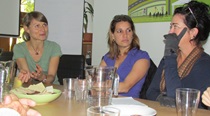Cuban attorneys inspired by the Pro Bono Attorneys programme
Cuban attorneys were interested in finding out how pro bono legal aid is provided to public benefit organisations within the Pro Bono Attorneys.

Civil society in Cuba is considered illegal by the regime
In Cuba there are no private law firms, individual law cases are assigned to judges via the state agency. The Cuban Legal Association (Asociacíon Jurídica Cubana) has been providing educational lectures for citizens aimed at the law in general, enhancing legal awareness and offering free legal advice to its citizens. Four Cuban attorneys, who took part in a study trip to Slovakia at the beginning of November, were from this association. “Civil society in Cuba has been suffering from many different forms of oppression for years: from illegal arrests to persecution and other types of reprisal. However, there have been recent changes as the regime has been trying to avoid international criticism, therefore civil society activists who teach are not being arrested, only “monitored,” the attorneys noted.
Attorneys of the Cuban Legal Association are still not allowed to provide legal advice. In doing so, they would face the threat of withdrawal of their law degrees. “Tolerating means monitoring and as an indirect result of this the number of legal course participants is limited (maximum ten in the capital city and six in provinces). In addition, the content of lectures is also controlled. Civil, criminal and commercial law is tolerated, however, basic human rights, constitutional law and political criticism are not.”
Cuban attorneys who attended Lucia Borovská’s lecture on the experience and development of the Pro Bono Attorneys programme, found it inspiring. The programmeenables attorneys and law firmsto help non-profit organisations through various means, including providing legal advice and direct help to people in need. “It was evident that the parallel with their work delighted them, since they also provide free legal help in the form of expert training, yet, under far more extreme conditions. We also discussed systematic barriers to solving the problem of homelessness in Slovakia and our pro bono help in this area particularly piqued their interest, because the status and definition of a person without a home have yet to be established in Cuba,” said Lucia Borovská, programme manager of the Pro Bono Attorneys programme. Attorney Eva Braxatorisová, who has been part of the programme since the beginning, shared her experience of pro bono cooperation aimed at helping the vulnerable groups at the lecture.
The Cuban attorneys participated in the study trip to Slovakia within the framework of a project realized by the People in Peril civic association. This project aims at supporting and strengthening civil society in Cuba. Help is offered specifically through material support for projects of six civic organisations directly in Cuba and through two study trips focused on exchanging knowledge and experience from the Slovakia’s transition period. On these study trips, attorneys meet experts from various areas and organisations as well as state representatives. Subsequently, at the meetings on the island of Cuba, they spread their obtained knowledge and experience among colleagues from civic organisations.








